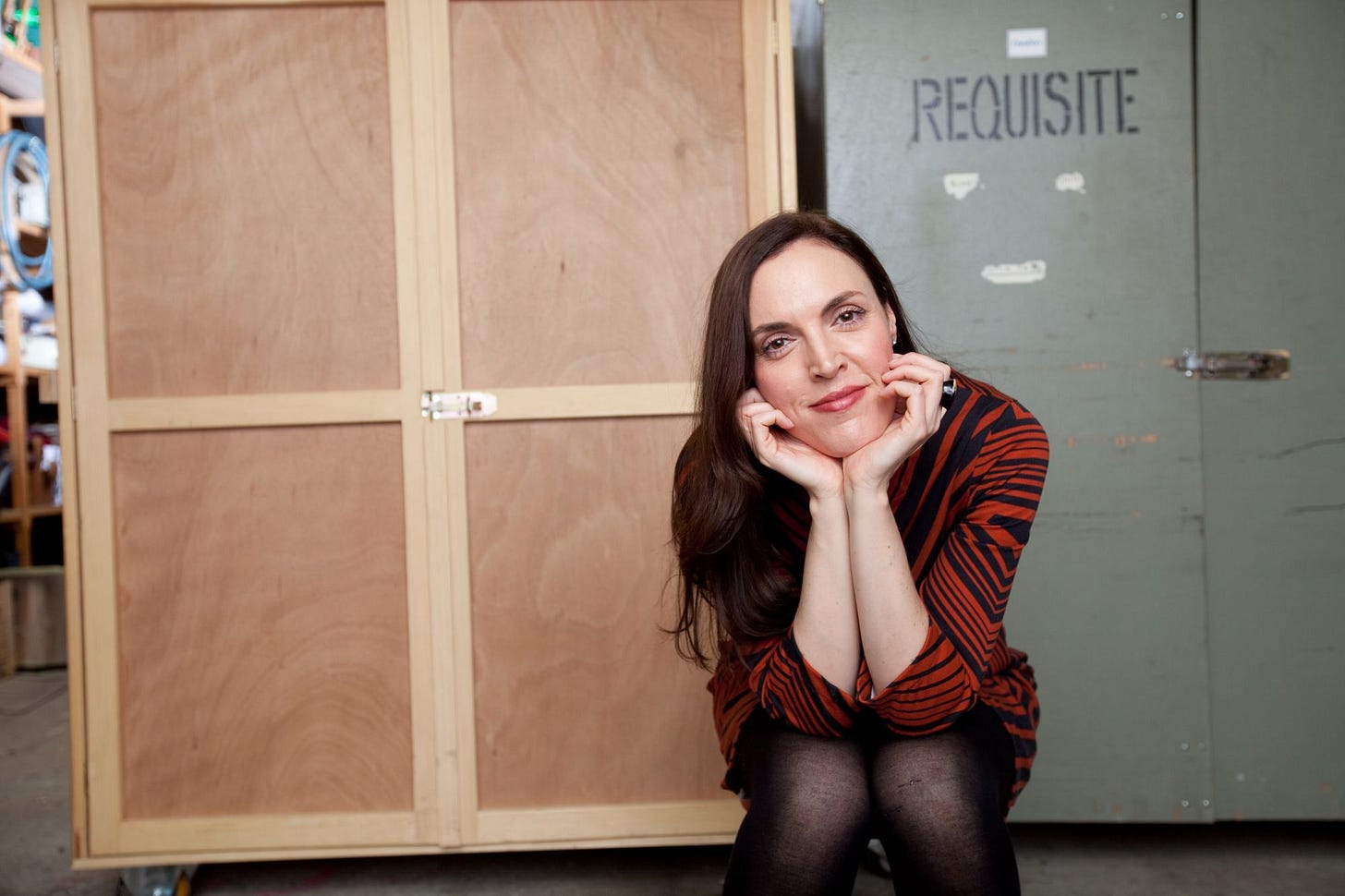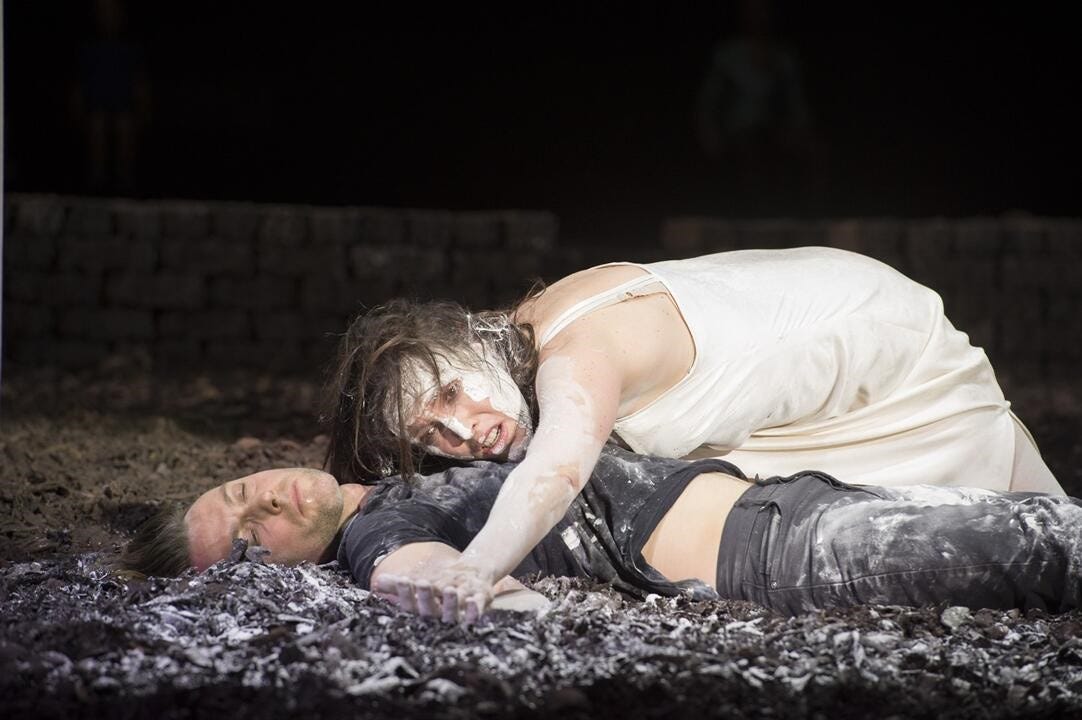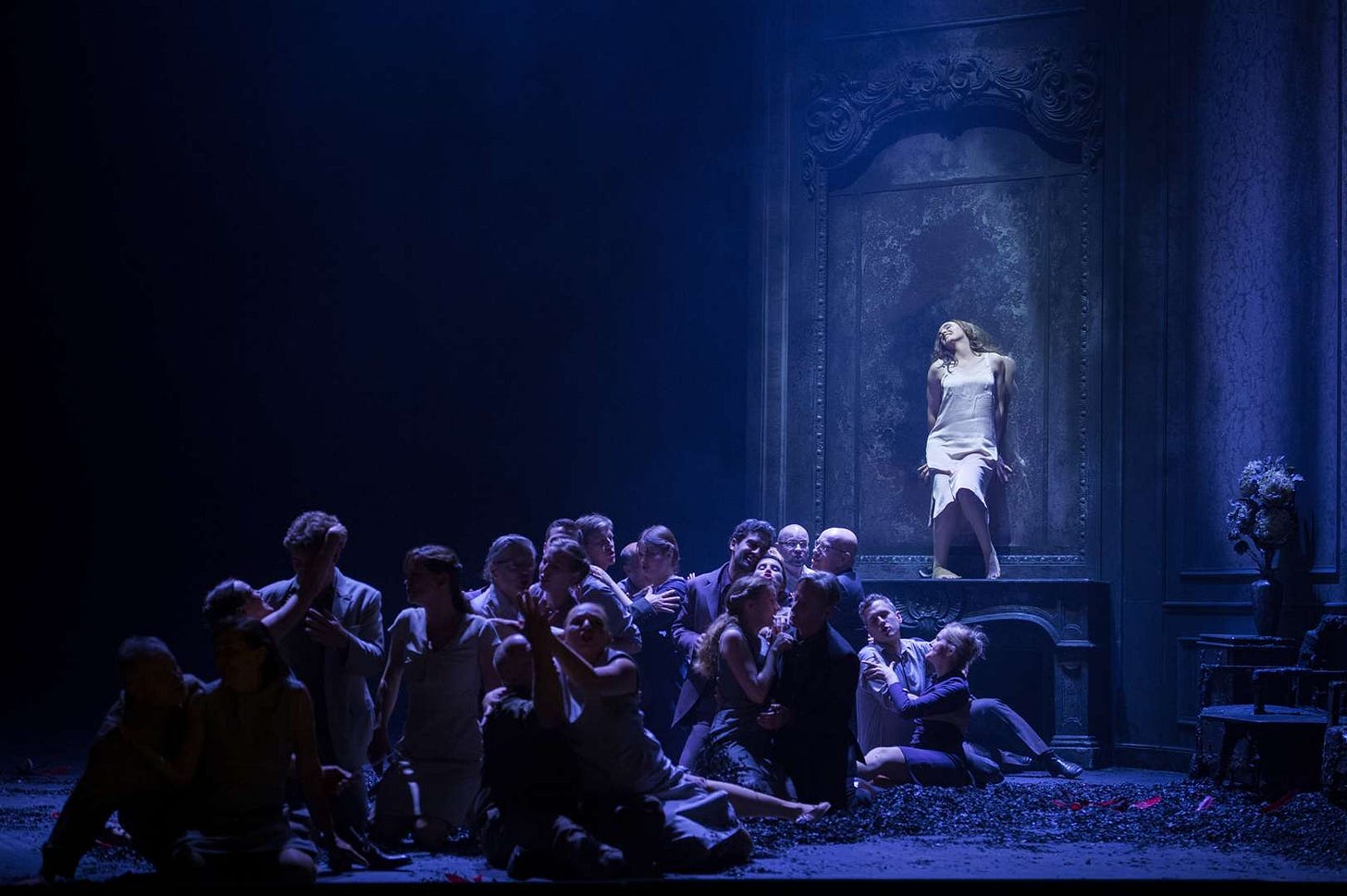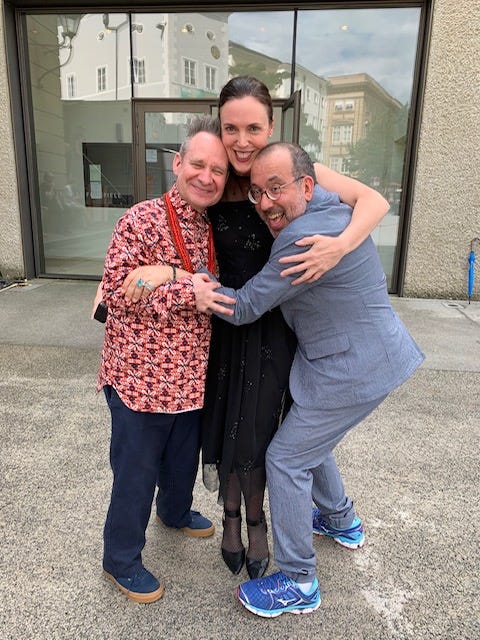Opera Daily 🎶 — An interview with Soprano, Nicole Chevalier
Good morning, friends, and welcome to the Sunday edition of Opera Daily, the best opera community on the internet.
To give you more of a taste of what’s to come, we are sharing an interview with Nicole Chevalier, an incredible dramatic coloratura soprano who is currently rehearsing for the title role in Jules Massenet’s Thaïs in Vienna. It has been said that an opera company does not decide to do a production of Massenet’s Thaïs and then look for a soprano to sing the title role. The only reason to stage this opera today is that a company has a star who wants to (and can) sing it. At the Met in 1978 that was Beverly Sills, and then in 2008 that was Renée Fleming. And now that is clearly Nicole Chevalier at Theater an der Wien later this month.
Nicole made her debut at the renowned Salzburg Festival in 2019 as Elettra in Mozart's Idomeneo. Since then, she has sung the title role in Verdi's La Traviata at the Musikfest Bremen, her role debut of Vitellia in La Clemenza di Tito at the Theater an der Wien and the four female roles in Offenbach's Les contes d'Hoffmann at La Monnaie in Brussels. Future highlights include Despina in Così fan tutte at the Festival in Aix-en-Provence and Elvira in Mozart's Don Giovanni and Vitellia in La clemenza di Tito at the Royal Opera House in London.
Thaïs is an opera filled with some incredible moments. It has a relatively simple story to follow. Set in the 4th century A.D. in North Africa, Thaïs tells the story of the monk Athanaël (baritone) who works to convert the Alexandrian courtesan Thaïs (soprano) to Christianity. The only hiccup is that he is in love with her. As she rejects her life of pleasure in service of a more satisfying spiritual love, Athanaël experiences the opposite, rejecting his religious vows to give everything he has to Thaïs. Unfortunately in the end, it is too late.
While the COVID-19 Emergency Measures Ordinance in Europe has made it challenging for the show to go on, Nicole is determined. When I talked to her this week, she said how Thaïs was “beautifully exhausting”. When you listen to some of the pieces and read more below about Nicole and the opera, I am sure it will become clear why.
Let’s dive in!
Interview with Nicole Chevalier, soprano
Given you are about to perform Thaïs in Vienna, which recording(s) of the opera would you recommend?
I tend to enjoy the more modern recordings of this opera with Renée Fleming, Barbara Frittoli, and Beverly Sills. It’s wonderful listening to all three sopranos because of their varying voice types and contrasting vocal interpretations: how they phrase and color the voice, where they breathe, how they move their voice, and their tempi (speed) in general. Fleming is a lyric (soprano), Frittoli is a more dramatic, lirico-spinto (soprano), and Sills a coloratura (soprano) — Thaïs is all three voice types in one role! As far as conductors are concerned, I very much enjoy Yves Abel’s interpretation for its musical range and his attention to detail: light dance-like rhythms expanding into rich verismo dramatic texture (quite characteristic of Massenet's operatic style). Abel keeps the music always moving and flowing with no hard stops or rough edges just like the French language itself.
What would you like people to know about Thaïs?
Thaïs, although one of Massenet’s most beautiful operas, is not often performed. Both leading roles (Thaïs and Athanaël) are extremely challenging to sing and portray as well as the opera itself poses challenges to convincingly direct. It is known for its famously revered Meditation (solo for violin and orchestra) as well as the beautiful duet between Thaïs and Athanaël at the end of the opera. Although the opera is mostly done in concert form or recorded, I am grateful for the chance to sing and perform the opera in Vienna this month.
🎧 Listen here to Nicole’s Thaïs recommendations:
Renée Fleming (Thaïs), Thomas Hampson (Athanaël), Final duet (live performance), Final duet (recording)
Renée Fleming (Thaïs), singing the work’s most famous aria, “Dis-moi que je suis belle.”
Renée Fleming (Thaïs), Thomas Hampson (Athanaël), Act I finale from the opera, “Qui te fait si sévère”, Yves Abel, conductor, Choeur de l’Opéra de Bordeaux, Orchestra National Bordeaux Aquitaine, 1998
Beverly Sills (Thaïs), singing “Dis-moi que je suis belle”, Lorin Maazel, conductor, New Philharmonia Orchestra, 1976
Barbara Frittoli (Thaïs), Lado Ataneli (Athanaël), Gianandrea Noseda, conductor, Teatro Regio di Torino, Torino Teatro Regio Chorus and Torino Teatro Regio Orchestra, 2008, Full Opera
Michael Rabin, Violinist, “Meditation” from Thaïs for Violin and Piano
(Nicole’s selections have been added to our playlist on YouTube).
Describe yourself in a hashtag.
#freespirit
What 3 people living or dead would you like to make dinner for?
Susan Sontag, Giuseppe Verdi, Marc Chagall, and Bob Dylan if someone canceled.
Book that you would recommend we all read?
I just read Bruce Springstein’s autobiography “Born to Run”, and it was excellent! If you like him and his music, if you like a great story and/or learning some of the wisdom life has to offer, if you like poetry or musical lyrics, then you’ll enjoy this book. Springstein is a fascinating storyteller and a magical weaver of words. He makes prose read like lyrics in a song…quite amazing.
What’s one ingredient you put in everything?
Garlic for its range of flavor and medicinal properties. Is there any better root vegetable than garlic...? Ginger could be a close second.
The best piece of advice you’ve received?
Trust yourself and have the courage to know when to speak your mind.
Before you sing, do you eat or drink anything special?
Spaghetti with tomato sauce, always...and a Coca-Cola if I am tired.
If your life were a song, what would the title be?
“Let the Sun Shine in”
What's your most controversial opinion about opera, and why do you hold it?
I don’t know if this opinion is “controversial”, but I have become more and more aware through the years as a professional singer that opera is to be experienced. It is to be interpreted and discussed and (maybe most importantly) related to where we came from, who we are and where we are going as people. It is not merely entertainment, nor is it just to be sung for the sake of preserving its magnificence like we protect great works of art in a museum, but rather it is to be utilized for its power to inspire, to provoke, to challenge, to move and even to heal through the art of storytelling and the power of sound.
What was the last role you performed?
Leonore in Beethoven’s opera, Fidelio (1806)

What is your favorite role to sing?
Oooooo, I am not sure I have a favorite role, but some roles have left significant impressions on me and have helped shape me as a singer and a performer — helped me find my voice and define my work “my purpose” in the opera business. Roles such as Lucia di Lammermoor, Violetta Valery (La Traviata), Elettra (Idomeneo), and Aribert Reimann’s modern opera, Medea.
Want to hear Nicole sing one of Elettra’s arias from Idomeneo? Listen to a live performance from Salzburg Festival:
Have you always known you wanted to be a singer or did the passion develop over time?
No. I remember singing at home for fun quite a lot as a kid. I loved music and played several instruments (piano, oboe, flute), but music was more of a pastime I enjoyed until I eventually decided to study voice in college on a whim. It was a complete non-sequitur, as well as a bit of a personal test to see if I could even get into music school. When I did, it became an even longer dance before I knew I could sing and that I wanted to pursue opera as a career.
Can you tell us what makes a great singer?
Well, talent and a solid technique of course, but these are a given. Then I would say tremendous drive, courage, determination, diligence, honesty, great heart, discipline and the X factor…that special something that makes you unique and sets you apart. It’s either there or it’s not — and I believe it is this “je ne sais quois” element that denotes greatness.
If you could sing any role, regardless of voice type, what would it be?
Éléazar, in Halevy’s opera, La Juive. It has true grit, incredible honesty and musical beauty and the high tessitura is tremendously challenging to sing well (quite typical of French repertoire). Plus, it would be great to play a male role; I would love the challenge!
The general feeling is that opera can be intimidating. Why do you think that is? And how do we make it more approachable?
Opera is intimidating because it is not a mainstream art form in most cultures. Art is a necessary part of a culture, but it needs to be taught, practiced, learned and experienced. It is a part of a person’s education, in my opinion. Art is not a luxury or just a hobby; but it is a necessary component in every individual's mental and emotional development — as important as literature, math, history, and science. Art is inherent to culture because it has the power to shape a people, a nation, a country and therefore our world.
How do you differentiate between a good operatic performance from a less good one? Do those two things even exist?
As a singer, I am usually thinking technically first and am hyper-focused on ironing out all the musical bits to become freer in playing the role, in telling the story of my character and therefore enhancing the communication between myself and the audience. But it is in those moments when I let go of the “how” and the “why” and am simply in the moment — not actively thinking about singing or acting — I release and genuinely enjoy, and I can feel my audience does the same. I have come to learn these performances are my best ones.
If you could play one aria for someone who has never listened to any opera, what would it be?
Händel’s “No, No I’ll Take No Less” from his opera, Semele.
Opera has a component to it that is “super human” or maybe better said, larger than life. Perhaps it’s the incredible beauty of sound it possesses or the technical precision one must master to execute it. Or it could be the enormous volume a voice can possess to cut through a 100 piece orchestra and fill a theater, or the delicacy and fragility of a perfect piano tone that sails to the back of a hall. Opera can be all of these things, and what I can say, after I finally nailed this Händel aria, I felt super human and larger than life!
Ask me about this, and I will tell you a good story.
The day I walked into Cafe Fleury in Berlin, and the rest is history…
🤔 Know someone who’d enjoy this interview?
Big thanks to Nicole for sharing with all of us today. 🙏
🗣 Have a question for Nicole? Leave it in the comments, and I will ping her in between Thaïs rehearsals for an answer!
Thank you again for reading and listening,
Michele







and it’s even better to hear you were so inspired to watch the opera and listen to some of the businesses greats!! 🙏🏼🙌🏻wonderful!
Thank you so much. I so enjoyed conversing with you! This role is my Wagner so far! 🤪